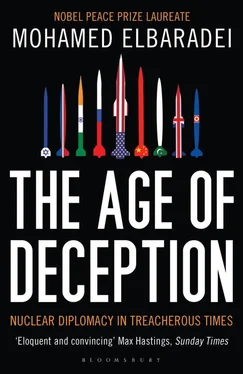Colin Powell called me a few hours before Bush was to give his speech. The president, he said, planned to announce seven new measures to counter the threat of weapons of mass destruction. Powell went on to imply that he personally did not agree with all of the ideas. “Some proposals are controversial,” he said, adding, “they will need to go to the IAEA Board for discussion.”
Now he had my attention.
As it turned out, there was a fair amount of overlap in the proposals Bush and I had put forward. Both of us called for tougher export controls, including the need to criminalize actions that deliberately supported proliferation. Bush also proposed more funds to secure existing nuclear material stockpiles. He advocated strong support for the Additional Protocol. He recommended an expansion of the Proliferation Security Initiative. [6] The Proliferation Security Initiative is a U.S.-led multinational program for the interdiction of ships at sea believed to be transporting nuclear materials. While many countries have signed on to the PSI, it is not conducted under the auspices of the United Nations, as one might expect of an initiative that claims authority over matters governed by international maritime law.
He suggested a cutoff on “newcomer” countries acquiring fuel cycle facilities—a distinctly different approach from mine. Of course there was no mention of nuclear disarmament. But in many of Bush’s proposals, there was the clear intent to address gaps in the proliferation regime that had been exposed by what we were witnessing in the Khan network.
Two of Bush’s proposals, however, seemed off the mark. The first called on the IAEA to establish a special Board committee to focus on safeguards and verification concerns. The second urged the IAEA to prohibit any Member State under investigation for possible safeguards violations from serving on its Board.
I was later told by a senior member of the Bush administration that the president’s speech had been written by John Bolton and Bob Joseph [7] From 2001 to 2005, Joseph worked for Condoleezza Rice at the National Security Council, as the senior director for proliferation strategy, counterproliferation, and homeland defense. He was heavily involved with Bolton in the development of the Proliferation Security Initiative and in the negotiations to persuade Libya to give up its WMD.
and had not been vetted by the State Department. The notion of a special safeguards committee, although ostensibly a good way to strengthen the Agency’s verification program, was born out of their desire to micromanage the IAEA’s verification work and particularly to force a hard-line approach on Iran’s nuclear program. The intent behind the proposal to exclude “countries under investigation” from serving on the Board—clearly targeting Iran—was not even well camouflaged and would not have worked. It revealed, more than anything, a lack of understanding: the protocols of multilateral diplomacy and mutual respect that make international organizations effective—much like the laws that govern democratic society—are not well served by prejudice, bullying, or a rush to judgment.
When I met with President Bush in Washington in March 2004, our conversation touched on the threat of the emerging nuclear black market. I mentioned that, while A. Q. Khan may have been the ringleader, it was clear he was at least in some cases not working on his own. For example, in the case of Iran, elements of the Pakistani army may have been involved, and in the case of North Korea, Khan may have been acting as part of state-to-state cooperation. [8] Since Pakistan is not part of the Nuclear Non-Proliferation Treaty and also not a member of the Nuclear Suppliers Group subscribing to export control guidelines, it is not bound by the obligations of either.
I based my assessment in part on a letter I had seen, handwritten by Khan himself. He had managed to get the letter out of Pakistan as a sort of insurance policy in the event of his arrest by Pakistani authorities. The letter asserted that he had been instructed by senior officers in the Pakistani Army to cooperate with Iran and North Korea.
Bush agreed that there were definite signs pointing to other Pakistani actors. However, it was clear that the complex relationship between the two countries—including the extensive help Pakistan was providing for U.S. operations in Afghanistan—would make it awkward for Washington to press the Pakistani government too hard.
Striving for a pragmatic approach, I concluded that our first priority was to find out who else had acquired technology through Khan’s network.
In the weeks that followed, international support built rapidly for new prohibitions against nonstate actors, designed specifically to criminalize and impede the types of clandestine activities carried out by the Khan network. In May, the UN Security Council passed Resolution 1540, requiring UN Member States to enact and enforce laws targeting individuals who in any way lend a hand to WMD proliferation. The resolution also called for new domestic controls, to tighten up access to nuclear and nuclear-related materials.
Not all the proposals in Bush’s speech fared as well, however. The exclusion of Member States under investigation from serving on the Board—a symbolic gesture designed to humiliate—never received serious consideration. And for the next two years, the Americans lobbied the Board to approve a special safeguards committee. I saw a useful role for such a committee if it focused on “ways and means to strengthen safeguards,” for example, by beefing up the IAEA’s forensic laboratories, which were in a dilapidated state. Once in existence, the committee did not last long. Major North-South differences quickly surfaced relevant to the fairness and effectiveness of the nonproliferation regime. After a series of rather nondescript meetings, the Board allowed it, in the words of one of the ambassadors, to “die a quiet and natural death.”
The emergence of the Khan network—the news that a high-level Pakistani government official had been running an international smuggling ring—was an enormous embarrassment for Islamabad. President Musharraf had no choice but to take action. On February 4, 2004, A. Q. Khan was forced to confess on a government-owned television network that he had been the ringleader of the illicit international nuclear network. But the very next day, Musharraf pardoned him, noting his service to Pakistan, although Khan remained under house arrest until 2009. To a non-Pakistani audience, the sequence of events was baffling: why an immediate, official pardon for the man who had single-handedly engineered nuclear proliferation on a massive scale?
Musharraf could not afford to be too critical. Khan’s status as national hero—the perception that he had made immense contributions to his country’s national security by helping Islamabad build a nuclear capability to counter that of India—gave him a degree of immunity from prosecution. Also, Khan quite likely could have implicated others in Pakistan’s government. There has been a great deal of speculation about how much the government knew about Khan’s activities and to what extent he had support from other government or military officials. Khan is reported to have used Pakistani government aircraft, on occasion, to transport nuclear-related equipment to non-Pakistani clients. [9] Douglas Frantz, “From Patriot to Proliferator,” Los Angeles Times , September 23, 2005.
His affluent lifestyle clearly suggested income well above his government salary, a direct indicator of his moonlighting activities. And press reports indicated that Pakistan’s National Accountability Bureau accumulated an extensive dossier on Khan but chose not to act on it. [10] Frantz, “From Patriot to Proliferator.”
Читать дальше












